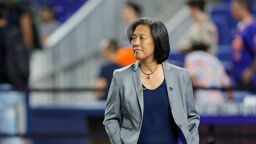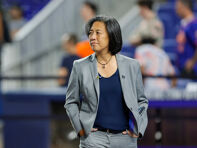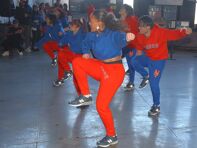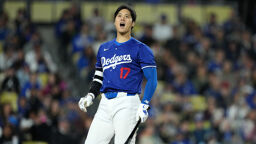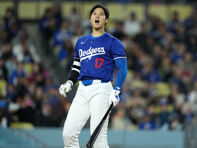Billy Bean and Billy Beane could not be more different. Yet they also have a lot in common. For many people, though, confusion reigns.
I got this text a couple of days ago. “Hey Billy, I’m sitting here watching a movie called “Moneyball” with Brad Pitt. Is he you?” Sigh. Even my own friends are confused. No, I replied, the movie is about Billy Beane, not Billy Bean.
There's no "e" at the end of my last name. That's what I've always told them. It's my auto response when people ask me if I'm the General Manager of the Oakland A's baseball club. I'm not him, I'm the "other" Billy Bean, the only man alive who played Major League Baseball to acknowledge he’s gay.
The other Billy Beane just happened to be my teammate in 1988 when we both played for the Detroit Tigers Triple A team, called the Toledo Mud Hens.
Billy Bean and Billy Beane could not be more different. Yet they also have a lot in common. For many people, though, confusion reigns.
I got this text a couple of days ago. “Hey Billy, I’m sitting here watching a movie called “Moneyball” with Brad Pitt. Is he you?” Sigh. Even my own friends are confused. No, I replied, the movie is about Billy Beane, not Billy Bean.
There's no "e" at the end of my last name. That's what I've always told them. It's my auto response when people ask me if I'm the General Manager of the Oakland A's baseball club. I'm not him, I'm the "other" Billy Bean, the only man alive who played Major League Baseball to acknowledge he’s gay.
The other Billy Beane just happened to be my teammate in 1988 when we both played for the Detroit Tigers Triple A team, called the Toledo Mud Hens.
I’ll never forget "that" Billy Beane. We both played in the outfield. I played center, he played left, and believe it or not, we had a right fielder named Pete Rice. Our outfield was coined "Rice and Bean's."
Beane struggled terribly through that season in our dismal ballpark on a last place team. On the field he seemed miserable, but in our clubhouse he was The Mayor. He would imitate Axl Rose to perfection when the hit song "Sweet Child of Mine" would play on MTV. He was "the ring leader of anarchy" among the players, and everybody loved him.
He was a smart minor league veteran who could rag players with the best of them. His crowning moment was an epic "soft shoe" performance one night while Frank Sinatra's "New York New York" blared over the sound system during a rain delay in Buffalo. Our manager, Pat Corrales, seething with anger, seemed ready to release him right then and there (we were losing by at least 10 runs, and in last place), but the entire team was dying with laughter. It was Billy's way of dealing with the disappointment of another bad season and a career that never happened the way it was supposed to happen for a "can't miss" prospect drafted in the first round. It was his ninth year in professional baseball and my third. I was still on the rise to the big leagues, full of hope. I hadn't been damaged (yet) by disappointment, failed expectations and years of leaving my heart and soul on fields where few people were watching, and worse yet, a parent big league club that stopped looking.
We were both born in Southern California, both dark-haired, All-American looking boys who played QB in high school and taught to say all the right things. When I played for the San Diego Padres from 1993-95, at every home game people would yell from the stands, "Hey Billy, remember me from high school?" He went to Rancho Bernardo High School in San Diego, where he was surely one of the all-time great high school athletes in that city's history. I'd often be signing autographs after the game and someone would politely say, “I remember you from high school,” and I'd say, "I'm sorry that wasn't me, you’re thinking of someone else, I went to Santa Ana High School about an hour north of here." Sometimes it just seemed easier not to embarrass them, so I'd go along with it.
I thought our paths might never cross again until about 10 years ago, when the book "Moneyball" came out. People were always asking if the book was about me. I read the book immediately and enjoyed it, but it was a stinging reminder that I had left baseball way too early. I still missed the game very much. I was very happy for Billy and it didn't surprise me at all that he had risen to the GM position at Oakland. He quit playing very young and got himself into a great situation, working for a forward-thinking executive named Sandy Alderson. I think Sandy was extremely influential shaping Billy's well-documented approach to evaluating players.
I remember being told by Randy Smith, who was the general manager of the Padres my first two years there, that I had a future in San Diego's front office whenever I was ready. It was a wonderful compliment, and to this day I often wonder what my life would be like had I chose that path. Maybe I would’ve been brave enough to come out as a part of the organization and blaze a trail that may have helped my community, but I was still uncomfortable with myself, too afraid to be a hero. When my partner Sam suddenly died right before the 1995 season, it changed me and I ultimately walked away from all of it. I gave up that front office opportunity the moment I acknowledged that I was gay. Baseball wasn't ready for that issue 15 years ago (I'm hopeful that will soon change, but that's for another article).
After the book "Moneyball" came and went, the questions went away, and the only times I thought about Billy Beane was when I would receive baseball cards in the mail to be signed for card-collecting fans. Inevitably, there would be four or five of my cards, and always one or two of his, even though our names were spelled differently. I was lefty, he was righty, he's at least 6'3" and I'm barely 6 feet tall. I would never sign his cards, but I would always send them back with a short note that said, "I'm sorry … this isn't me, he's the other one."
At the time, as I was becoming more and more recognized as a member of the LGBT community, I was sure that Billy was getting the short end of the stick. It was OK for me to be confused with a general manager of a Major League Baseball team, but I wasn't so sure how he felt about people thinking that he was "the gay baseball player.” He's a straight Republican, who's married with kids, and I'm a gay Democrat with two Jack Russell Terriers. To make matters worse for him, my book, "Going the Other Way: Lesson's From a Life in and out of Major League Baseball" came out in the summer of 2003. It spread through the sports world pretty quickly. It's the one topic that catches every athlete's attention, and not always in a good way. However, I have to say that the reaction to my book by players was mostly supportive. I was told that Billy was constantly receiving my cards for him to sign. The LGBT community in San Francisco and Oakland area was hopeful, but ultimately disappointed that I was not him.
My book rights were quickly purchased by the Showtime Network and news spread that a film was being made. The screenplay was written, and then the fun game of "who’s going to play Billy Bean?" began. I've been asked that question so many times that I've lost count, and truth be told, I was pretty anxious to find out as well. I have learned that patience is a virtue when waiting for a film to be made. Promises mean very little, and feelings get hurt often. I read that "Moneyball" has taken more than eight years to come to the silver screen, so I’ll keep waiting for my turn.
Last year, when news that the film “Moneyball” was finally happening and none other than Brad Pitt had agreed to play "Billy Beane," it sent a wave of enthusiasm through sports fans in the LGBT community. An avalanche of questions came my way via Facebook, e-mails, and texts, asking me how it felt to have Brad Pitt playing me in a movie. Was I excited? Many people were asking if I had met him, and what was he like? I mean, really, if anyone could pick one man on earth to play himself in a movie, Brad Pitt is the guy.
I truly wish I could have answered all of those questions, but I don't know how it feels. Sadly, I only know how it feels to have Brad Pitt playing someone with my name, about baseball, but NOT me, in a wildly successful major motion picture. Is that surreal or what? Honestly, the feeling sucks. It's like being told you’ve won the lottery, but then finding out that you really didn't, because you only have the first four numbers right, but you need five to win it all.
The movie is amazing and you should go see it. One of Hollywood’s greatest writers, Aaron Sorkin wrote it, and I'm sure that Brad Pitt will finally win an Oscar for Best Actor. Not because he’s long overdue for his profession's crowning achievement, but because it will cement my fate of having to answer this question for the rest of my life and say, no it's not me….it's the "other" Billy Bean(e).
Truth is, I don’t really mind the questions at all. I’m happy for Billy Beane, and his movie, but I wouldn’t trade places with him for all the money in Major League Baseball. My friends, my family, my community. I’m the luckiest guy in the world.
Billy Bean — the one who wrote this article, not the other one — can be reached via email: [email protected]. Bean's coming out made Outsports' list of 100 greatest gay sports moments.









